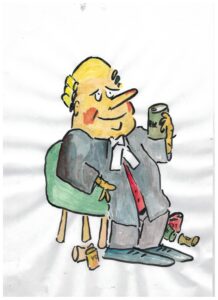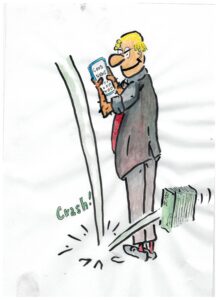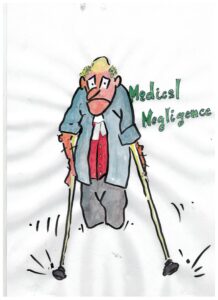Waiver
- 2021-08-16
- By Dr Will Higgs PhD, Barrister
- Posted in Contract Law
Commonwealth v Verwayen (1990) 170 CLR 394 at 406. At 406-407 Mason CJ said:
“According to its strict legal connotation, waiver is an intentional act done with knowledge whereby a person abandons a right by acting in a manner inconsistent with that right: Craine v Colonial Mutual Fire Insurance Co Ltd [(1920) 28 CLR 305, at p 326.]; Grundt v Great Boulder Pty Gold Mines Ltd [(1937) 59 CLR 641, at p 658.] However, the better view is that, apart from estoppel and new agreement, abandonment of a right occurs only where the person waiving the right is entitled to alternative rights inconsistent with one another, such as the right to insist on performance of a contract and the right to rescind for essential breach: see Kammins [[1971] AC, at p 883.] This category of waiver is an example of the doctrine of election.
Another category of waiver is one in which a person is prevented from asserting, in response to a claim against him, a particular defence or objection which would otherwise have been available. Here waiver is said to arise when the person agrees not to raise the particular defence or so conducts himself as to be estopped from raising it: see Kammins [[1971] AC, at p 883.].”
SEARCH BLOG POSTS
LATEST BLOG POSTS
- Updated product safety mandatory reporting guidance for suppliers now available
- Pleading fraud – cause and effect is essential
- Does the Trustee’s right of indemnity have priority over the right of beneficiaries in relation to assets?
- Rules of war (in a nutshell) | The Laws Of War
- MH370 Final Report
Past Blog Posts
- December 2021
- September 2021
- August 2021
- May 2021
- April 2021
- March 2021
- August 2020
- February 2020
- September 2019
- February 2019
- December 2018
- July 2018
- April 2018
- December 2017
- May 2017
- February 2017
- December 2016
- November 2016
- October 2016
- September 2016
- August 2016
- April 2016
- March 2016
- October 2015
- September 2015
- August 2015
- May 2014
- April 2014
- March 2014
- January 2014
Categories
- Appeals
- Artificial Intelligence
- Aviation law
- Banking and Finance Law
- Blogs
- Civil Liability Act
- Class Actions
- Coding for lawyers
- common law
- Consumer Claims (TPA)
- Contract Law
- Contractual Interpretation
- Criminal law
- Deeds
- Docassemble
- duty of care
- Engineering Law
- Equity
- Evidence
- Exclusion Clauses
- Execution of documents
- Expert Witness
- featured
- Financial Services
- Fraud
- Fundraising (Chapter 6D)
- General comment
- Home Building Law
- Insurance
- Legal drafting
- Local Court
- Medical Negligence
- MH370
- Motor Accidents
- Negligence
- Occupiers negligence
- Other
- Personal Injury
- Personal Property Securities (PPSA)
- Pleading
- Practice & Procedure
- Products Liability
- Property
- Real Property
- Reasons for a decision
- Securitisation
- Security (Mortgages & Charges)
- Sentencing
- Swaps & Derivatives
- Teaching
- Transactional Law
- Transfer of financial assets in transactions
- Trusts & Trustee Law
- Uncategorized
- War and Weaponry
- Witnesses
SEARCH BLOG POSTS
LATEST BLOG POSTS
- Updated product safety mandatory reporting guidance for suppliers now available
- Pleading fraud – cause and effect is essential
- Does the Trustee’s right of indemnity have priority over the right of beneficiaries in relation to assets?
- Rules of war (in a nutshell) | The Laws Of War
- MH370 Final Report
Past Blog Posts
- December 2021
- September 2021
- August 2021
- May 2021
- April 2021
- March 2021
- August 2020
- February 2020
- September 2019
- February 2019
- December 2018
- July 2018
- April 2018
- December 2017
- May 2017
- February 2017
- December 2016
- November 2016
- October 2016
- September 2016
- August 2016
- April 2016
- March 2016
- October 2015
- September 2015
- August 2015
- May 2014
- April 2014
- March 2014
- January 2014
Categories
- Appeals
- Artificial Intelligence
- Aviation law
- Banking and Finance Law
- Blogs
- Civil Liability Act
- Class Actions
- Coding for lawyers
- common law
- Consumer Claims (TPA)
- Contract Law
- Contractual Interpretation
- Criminal law
- Deeds
- Docassemble
- duty of care
- Engineering Law
- Equity
- Evidence
- Exclusion Clauses
- Execution of documents
- Expert Witness
- featured
- Financial Services
- Fraud
- Fundraising (Chapter 6D)
- General comment
- Home Building Law
- Insurance
- Legal drafting
- Local Court
- Medical Negligence
- MH370
- Motor Accidents
- Negligence
- Occupiers negligence
- Other
- Personal Injury
- Personal Property Securities (PPSA)
- Pleading
- Practice & Procedure
- Products Liability
- Property
- Real Property
- Reasons for a decision
- Securitisation
- Security (Mortgages & Charges)
- Sentencing
- Swaps & Derivatives
- Teaching
- Transactional Law
- Transfer of financial assets in transactions
- Trusts & Trustee Law
- Uncategorized
- War and Weaponry
- Witnesses




